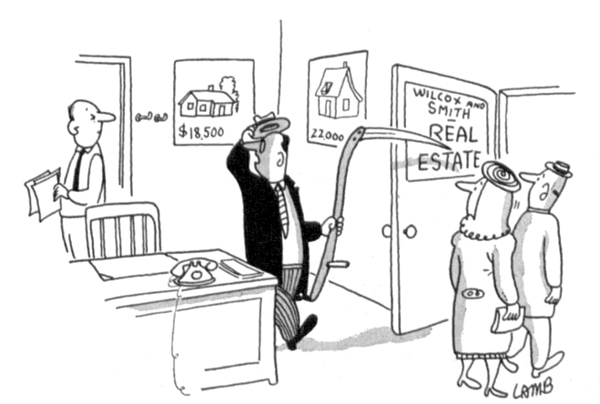An Introvert Buys Property: Finding A Property Agent To Trust (Part 2)
November 24, 2021

As a self-professed introvert, I’m used to doing things on my own. But after months of fruitless solo property hunting, I finally conceded that I needed a property agent.
It was just after Circuit Breaker ended in 2020 when I made the decision to engage a property agent. After spending weeks living, working, and socialising almost entirely out of my bedroom, I was desperate to find my own home. I had to step up my property search, and I needed help.
I had plenty of hopes for my would-be agent. They’d help sift through listings, arrange viewing appointments, and accompany me on viewings. I also needed someone much more knowledgeable about the property market. And even though I’m an introvert, the thought of having a sounding board in this huge life decision was very appealing.
From the numbers in Stacked’s article on property agencies, I estimate there are at least 30,000 property agents in Singapore. And I just needed one. Easy, no?
Sandra
I met Sandra (not her real name) through a family member. Sandra worked for one of the larger property agencies and had a stable of higher net worth clients. She was a middle-aged, bullish woman who looked like she’d fought tooth and nail to get to where she was in life. Surely having someone like her on my side was a good thing.

When we first talked, I said I was looking for a resale property to purchase and move into preferably by early next year. Even over the phone, I could hear the disdain in her voice as she was explaining why resale properties were a no-no.
In fact, over the next few weeks, whenever I sent her a resale listing I was interested in, I would get a call from Sandra almost immediately. In her low but insistent smoker’s voice, she’d explain that the value of every resale property would sink faster than the Titanic.
Her solution? Only buy new launch condo units.
And as a (relatively) young homebuyer, Sandra said I needed to take advantage of the longest and largest mortgage possible. That would effectively double my original budget by almost 50%. I even received a “wealth generation” report with the same conclusion, the caveat being that I had to drain my CPF and borrow an amount way larger than I was comfortable with from the bank.
Most of my phone conversations with Sandra lasted an hour as she extolled the virtues of brand-new properties. On a number of occasions, I’d protest about neither wanting to wait three years, nor being so heavily in debt, but Sandra would always dismiss it with the same gravelly “you’re-not-married what’s the rush”. I’d hang up the phone with my heart racing with anxiety and ears burning with shame.
Eventually, I stopped answering her calls and texts.
William
Not gonna lie – I was really upset after my experience with Sandra. I was seriously considering searching for property all on my own again, or even throwing in the towel completely. But that was when I found William, an agent with one of the smaller property agencies.
I came across William’s website through an ad, and what lifted my spirits was his client philosophy: “Never a fan of high pressure sales tactics, or template solutions, I believe that real estate advisory is not a one-size-fits-all. Every client has his/her own unique needs and financial status, and my role as a realtor is to tailor a custom strategy to help them achieve their goals – be it a dream home or a property for investment.”
“Hi William,” I typed. “I was hoping you’d help me find a home.” (Dramatic, I know.)

We connected in July 2020. William was a dapper man in his 40s, and carried himself with the kind of confidence I’d always wished for. He was also the owner of a beautifully renovated HDB flat that had been featured in the media, so I knew assessing the interior design potential of a property was something we’d see eye to eye on.
William soon proved he was trustworthy, especially because I was a terrible client. If you remember from Part 1, I had no clue where I wanted to stay or what I wanted to live in, so we viewed a wide range of properties all across the island. And despite the possibility of earning a smaller commission, William recommended both private and HDB resale properties that fit my needs.

Homeowner StoriesAn Introvert Buys Property In Singapore: Going It Alone (Part 1)
by DanWilliam and I packed in viewings on weekends, and even made a couple of offers that were rejected. In between viewings, William advised me on investment and exit strategies for all possible scenarios, and we even discussed interior design possibilities for various layouts.
In late August, we visited a recently MOPed four-room flat in Bukit Panjang that I decided was the one. William negotiated a better price on my behalf that was accepted, and by late November, I was the sole owner of my first home!

Looking Back
More from Stacked
So many readers write in because they're unsure what to do next, and don't know who to trust.
If this sounds familiar, we offer structured 1-to-1 consultations where we walk through your finances, goals, and market options objectively.
No obligation. Just clarity.
Learn more here.
We Tracked The Rise Of Million-Dollar HDB Flats By Estate — And The Results May Surprise You
Way back in 2012, Singapore saw its first-ever million-dollar HDB flat transaction: a rare a flat at 149 Mei Ling…
It would be easy to conclude Sandra was a “bad” property agent and William, a “good” one. But the reality of it is that they’re both successful agents with solid track records. One just happened to suit me better than the other.
I’m not always a great judge of character, but from my experiences with Sandra and William, I’ve come up with three questions that can help you decide if you’ve found the right property agent:
Firstly, are they listening? I found Sandra to be patronising, but it took me a while to recognise that because after all, I was the property noob and she was the experienced agent. I can imagine naysayers wanting to say to me that if I’d listen to her, I could be rich and living in a condo.
But as an introvert, I do rely on my emotions when logic fails me. And with Sandra, not being listened to made me feel small and ashamed.
William demonstrated through his recommendations and advice that he had listened to what I wanted, and he was going to help me find my dream home on my terms.
And these experiences also taught me there’s a difference between being pushed out of your comfort zone and dragged past your boundaries. Both make you feel scared, but one makes you grow, and the other, shrink. And it all comes down to whether you’re truly being heard and seen by your property agent.
Consider ‘listening’ the lowest bar to evaluate a property agent by. If at any point you feel like you’re not being heard, it’s a sure sign to turn around and walk away.
Secondly, are they able to help you? The point of engaging a property agent is for them to help you. It’s such a straightforward point, but it can be challenging to recognise and call out when a situation is not helpful to you. If you’re like me and typically non-confrontational, you’d rather swallow your discomfort and trust in expert opinion.

Sandra specialised in the private end of the property market, and very likely only in investment properties. If I were in the market for something like that, Sandra would’ve been the right agent for me. But I simply wasn’t.
William had experience in almost all segments of the property market. His breadth of knowledge was more suited to my property search, which was also wide and varied. William’s advice extended to long-term property strategies and opportunities that suited both my single lifestyle and low-risk disposition.
Help comes in all forms. Maybe you need a William that can help you make your property dreams come true. Or sometimes, you may need a Sandra to push you into dreaming bigger, if that doesn’t overstep your boundaries.
Thirdly, can you trust them? The first two questions can help you gauge the trustworthiness of an agent.
You can also look at other signs, such as a strong sales track record and glowing client testimonials, but I wouldn’t place too much stock in them. These accolades seem to be a dime in a dozen judging by the ton of property agent flyers I’ve been receiving that all say pretty much the same thing.
Some people take shortcuts by looking for agents that they already have a relationship with. Or they go by the recommendation of someone they do trust. But that’s how I landed Sandra, and look how that worked out for me.
I wish I could give you a set of questions that will help you suss out untrustworthy agents, but the fact of the matter is, no test of trust is foolproof. You’ll just have to go into a relationship with any property agent with your eyes, ears, and heart wide open. And like in any relationship, if it’s not working for you, just leave.
I was going to conclude by comparing finding a property agent to dating, but as a single person, I probably shouldn’t be doling out that sort of advice. Besides, they are not quite the same thing. If you’re dreaming of a home for yourself, the property agent is someone that can make that dream come true. That’s too huge a responsibility for a loved one to shoulder, but that is the job of a property agent.
And fellow introverts, when deciding if a property agent can help you, use your natural skepticism and sensitivity to your advantage. And before you learn to place your trust in someone else, learn, above all, to trust yourself.
Come back for Part 3 when I’ll tell you about the properties I had to sadly let go.
At Stacked, we like to look beyond the headlines and surface-level numbers, and focus on how things play out in the real world.
If you’d like to discuss how this applies to your own circumstances, you can reach out for a one-to-one consultation here.
And if you simply have a question or want to share a thought, feel free to write to us at stories@stackedhomes.com — we read every message.
Dan
Dan is a diehard introvert, freelance writer, first-time property owner, and backseat interior designer. He posts pictures of his home and writes about an odd combination of interior design, lifestyle, and self-development on his Instagram channel @stayingonthehill.Need help with a property decision?
Speak to our team →Read next from Homeowner Stories

Homeowner Stories We Could Walk Away With $460,000 In Cash From Our EC. Here’s Why We Didn’t Upgrade.

Homeowner Stories What I Only Learned After My First Year Of Homeownership In Singapore

Homeowner Stories I Gave My Parents My Condo and Moved Into Their HDB — Here’s Why It Made Sense.

Homeowner Stories “I Thought I Could Wait for a Better New Launch Condo” How One Buyer’s Fear Ended Up Costing Him $358K
Latest Posts

Pro This 130-Unit Condo Launched 40% Above Its District — And Prices Struggled To Grow

Property Investment Insights These Freehold Condos Barely Made Money After Nearly 10 Years — Here’s What Went Wrong

Singapore Property News Why Some Singaporean Parents Are Considering Selling Their Flats — For Their Children’s Sake



































4 Comments
When employing licensed real estate agents property sellers and buyers should be aware of the following:
1) Section 2.1 of CEA’s Code of Ethics for Professional Client Care (CEPCC) that licensed real estate agents have to follow. This states, inter-alia, that licensed agents are NOT allowed to give advice on valuation issues like “fair price”, “fair value”, market price vs fair price, valuation methodologies, etc. Clients are likely to be misled by agents by keeping silent on this issue.
2) Agents are “transaction-driven” – no sale, no commission. As a result, there is an inherent conflict of interest for property sellers. It is obviously easier to convince a seller to lower his asking price than to convince the buyer to agree to a higher price. Why? Because the former will often just make less money but is still making a profit. The latter may have limited funds and/or borrowing capacity and cannot come up with more money even if he/she wanted to.
3) Note that in the private property market it is the market practice that only the seller pays a commission. The agent can be trying to lower the price to help the buyer to get the deal done but the seller is the one paying his/her commission.
SOLUTION:
1) Property seller should do their own “homework” and not rely solely on a licensed agent on price issues. A lot of relevant info is available online. The role of the agent is really just “handholding” – arranging for online advertising and following up on the paperwork if the property is sold.
2) Property sellers should NOT give “exclusive” mandates to agents. Competition between agents is ALWAYS good.
3) Property agents should only rely on agents to market their property and find potential buyers. Property owners should negotiate DIRECTLY with the buyer. Do NOT let the agent stand between the seller and buyer when the price is discussed. The agent appointed by the seller can observe the direct negotiation between seller and buyer but should not participate because of the conflict mentioned above. The agent can follow up with documentation AFTER the seller and buyer agree on the price.
Great Blog! For introverts buying property, finding a trusted agent is key. Seek someone who respects your privacy, communicates well, and understands your needs for a smooth purchasing process tailored to you.
Thanks for the sharing! I am in the same boat as encountering a pushy agent as a first-time home buyer. I know my budget is low in condo market, while it is still a decent amount of money for 1 bedroom. Pushy agent makes me feel small and angry during house hunting, I was not given any useful information but conclusion only like “this is the best”, “no point to check the rest”. If buyer cannot trust agent at all, no deal will be made.
Really appreciated this — it’s comforting to see guidance tailored for introverted home-seekers. The contrast between pushy agents and respectful, understanding ones feels spot on. The advice about asking for honesty, patience and genuine listening skills is something all buyers — introverted or not — should keep in mind.